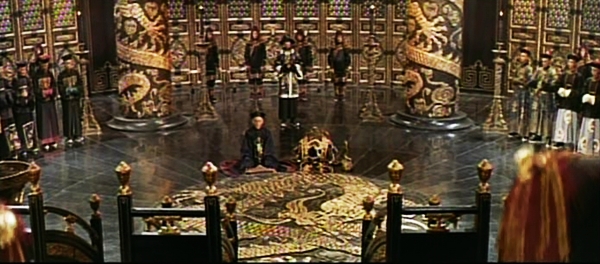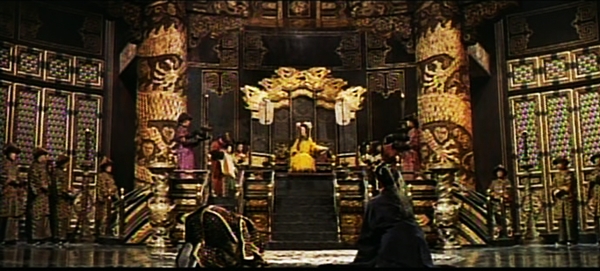

![]()
![]()
|
LAMENTING THE ART OF MOVIE CITIES Two months into filming 55 Days at Peking director Nicholas Ray suffered a heart attack and was unable to resume duties. The impression given in Charlton Heston’s The Actor’s Life is co-star Ava Gardner may have been the decisive factor in Ray’s illness—she was pulling a few too many star numbers. Always late, refusing to work if suspecting she was being photographed surreptitiously by the paparatzzi, demanding rewrites. (On this last complaint, so did Heston and David Niven.) And according to co-screenwriter Philip Yordan, she was drunk most of the time. Evidence of the charge shows up in Ava’s occasionally bloated cheeks and the brevity of her scenes, in which large portions of her lines had been cut or given to others because she couldn’t remember them. But we don’t miss what we don’t hear; she’s such a super likable broad that minimizing saves her. She’s using Alexandre de Paris for hair styles, which are the closest she gets to being a Russian Baroness, wears a few great hats, looks better in black than white formal, and she changes outfits just about everytime she runs from Chinese bullets. When her character’s major sin is revealed we couldn’t care less, but we know she’ll eventually make that good sacrifice for the humanitarian cause. In what Heston calls “this unresponsive lump of material” about the 1900 Boxer Rebellion, he’s not much better; despite his vocally weighted Americanness, he’s at his puniest, the flat ass poorly served by sloppy tailoring would make perfect NRA target practice. Amusing, though, to see him boozing, beer in one hand, hard stuff in the other. An inadequate script from the beginning and loaded with idiot simplifications as dialogue, the movie suffers most from lack of momentum, as the danger we need to feel about the bubbling violence the foreign diplomats and their service and military personnel are surrounded by is displaced by discernibly clumsy exhaustion due to various production and heat problems and Ray’s battles with producer Samuel Bronston. The one and only plus in this feeble mess, and restored to oohs and aahs in Blu-ray, is the movie city. The Fall of the Roman Empire was under construction when Bronston convinced a skittish Heston to do 55 Days after he turned down Fall and the crews quickly modified Roma to Peking. Designed and appointed to nearly the very max of their utility by those wizards Veniero Colasanti and John Moore (who also did the costumes), the sets are the movie—our eyes glued to them to counter the disappointment in everything else. With Imperial throne pillars wrapped in serpents, 3-fold screens as lacquered gems, the ageing processs on brick and timber, even sewers this impressive, I’m lamenting the loss of an art form. Large portions of the sixty acres of sets were never photographed, not even via a sweeping aerial, which would have better served as a credit-filled beginning than the place cards we get, but photographer Jack Hildyard managed to get a few short pans teasing how immense the project really was. (Heston’s right—the setting in its entirety would have made an ideal location for an Orson Welles art-farter; when Peking reverted to Roma, the sight became a popular tourist attraction until it fell into disrepair.) Guy Green finished the principal shooting, while Andrew Marton and other second-unit directors completed the chaos of the climatic sieges, enjoyably blowing up set after set. Dimitri Tiomkin is at it again with those horns, this time long Chinese trumpets, and if he surprises with the Entr’Acte, supplying a lightly orchestrated and at times prematurely jazzy waltz, he then blows it for the Exit with Andy Williams crooning “So Little Time,” co-written by Paul Francis Webster. Blacklisted Bernard Gordon co-writer. Flora Robson, who had a yen for juicy fruiters like Ftataleeta in Caesar and Cleopatra and Angelique in Saratoga Trunk, does a Bea Lillie kind of Dowager Empress wearing show-stopping headdresses, tassels and pendant earrings. With Paul Lukas, Leo Genn, Robert Helpmann, Kurt Kasznar, John Ireland, Harry Andrews, Elizabeth Sellars and uncredited Alfred Lynch as a Richard Harris look-alike smitten by Ava. In SUPER TECHNIRAMA 70. (Opening 5/29/1963 at the Michael Todd, running 8 weeks.) Oscar nominations for best musical score and best song. ROLL OVER IMAGES 

Text COPYRIGHT © 2000 RALPH BENNER Updated 2/2010 All Rights Reserved. |